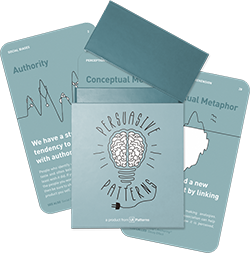Zeigarnik Effect
Design Pattern
Problem summary
We remember uncompleted or interrupted tasks better than completed ones
Usage
- Use to drive users toward finishing a list of tasks
- Use to drive users toward completing tasks that wasn’t necessarily part of their own agenda to begin with
- Use to drive users to explore the full with of what your product has to offer
- Use to remind users of unfinished business
This card is part of the Persuasive Patterns printed card deck
The Persuasive Patterns Card Deck is a collection of 60 design patterns driven by psychology, presented in a manner easily referenced and used as a brainstorming tool.
Get your deck!Solution
- Break down complex experiences. Split content into smaller parts making each portion easier to digest.
- Indicate progress clearly. Provide a clear indication of progress in order to motivate users to complete the full list of tasks. The task list can originate from a larger broken down task, but also an artificially created list of tasks to “complete onboarding” or “finish setting up the project”.
- Reminder to finish. An interrupted or incomplete task leads to a strong motivation to complete the action. Find ways to remind users that they have unfinished business and show them ways to finish it.
Rationale
The Zeigarnik effect suggests that when we suspend our work on a task to perform unrelated activities, we will remember the details of the first task better than people who complete it without a break.
Bluma Wulfovna Zeigarnik was a Soviet psychologist discovered the Zeigarnik effect and contributed to the establishment of experimental psychopathology as a separate discipline in the Soviet Union in the post-World War II period. In Gestalt psychology, the Zeigarnik effect has been used to demonstrate the general presence of Gestalt phenomena.
1 Zeigarnik, B (1927) Über das Behalten von erledigten und unerledigten Handlungen, Psychologische Forschung
2 Koffka, Kurt (1935). Principles of Gestalt Psychology. London: Kegan Paul, Trench, Trubner & Co. p. 334ff
3 Zeigarnik Effect on Wikipedia
4 The Zeigarnik Effect: Why it is so hard to leave things incomplete. by Abhishek Chakraborty
5 The Zeigarnik Effect at Learning Loop
User Interface Design Patterns
- Forms
- Explaining the process
- Community driven
- Tabs
- Jumping in hierarchy
- Menus
- Content
- Gestures
- Tables
- Formatting data
- Images
- Search
- Reputation
- Social interactions
- Shopping
- Increasing frequency
- Guidance
- Registration
Persuasive Design Patterns
- Loss Aversion
- Other cognitive biases
- Scarcity
- Gameplay design
- Fundamentals of rewards
- Gameplay rewards
